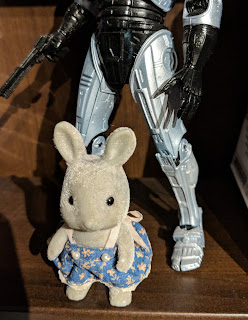Ender’s Game
Orson Scott Card, 1985
Hugo Winner - 1986
Premise: Years after a catastrophic attack, the world military tests and trains children in an attempt to find and mold a mind smart, fast, and flexible enough to lead the fleet against a galactic force of creatures that think nothing like humans. You know this book, it’s the one where they teach kids to fight wars with video games unironically.
Let’s deal with the elephant in the room first. Orson Scott Card is an asshat who has said a lot of despicable things and supported heinous organizations.
I have heard nothing but terrible things about his recent work, and I wouldn’t pay money for anything with his name attached unless he were to publicly change his tune drastically.
I was dragging my heels to read this book, ending up borrowing it from the library. But I read Ender’s Game, Speaker for the Dead and Xenocide years ago, and I remembered them as not awful.
So I tried to give the book a fair shake, and found that… the ending held up pretty well. The book overall has a real telling-not-showing issue with how much time it has to cover with the first two thirds. There’s a lot of plainly saying that characters developed feelings or stating (paraphrase) ‘And Ender was further isolated from the others, even as his team continued to win.’ The style gives it a feeling of distance, which I guess isn't a terrible choice, but it lacks any tension for much of the first half.
The weirdest/worst thing about reading Ender’s Game today is how there is an unspoken, unexamined assumption at the heart of many character interactions. This is: that even given years and years facing an external threat, and huge advances in technology, humankind will not move past the prejudices and internal conflicts faced in the 1980’s.
Notable examples of this (besides the endless continuation of the Cold War) include a character who embraces Jewish stereotypes and a side comment about how army leaders beat in the game by his forces became ‘Jew-haters,’ as if that was an understandable reaction. Another is a General’s comment about why girls don’t generally go to the Battle School: “too many centuries of evolution working against them.” Even aside from the utter hilarity of the idea of ‘centuries of evolution,’ this sexism passes unquestioned, even though they’re not actually training infantry fighters to carry hundreds of pounds. They’re training kids to be fast and clever, and most of them start prepubescent.
It’s not that these comments couldn’t make sense for the characters who utter them given the world of the book, it’s that the choices feel deeply lazy. It feels to me as though no thought was given to whether/how society would change given an alien attack.
Now, all that said, Ender’s Game is still important. It foreshadowed the rise of the internet as a source of influence in a big way. The ending reveal still hits pretty well, even though I knew it was coming. The whole closing of the book feels mythic in an interesting way, although I think the version I read includes the 1991 rewrites which were added to link this book with the larger series that followed.
So did I like it? It’s a hard question to answer in the end. I think I liked it. I think most of it is actually well-written. However, I think anyone reading it today should go in with a healthy awareness of how dated some of the material is.
4 Stars - A Very Good Book, despite serious issues.




Comments
Post a Comment
FYI: Most comments are moderated, and will not appear immediately.